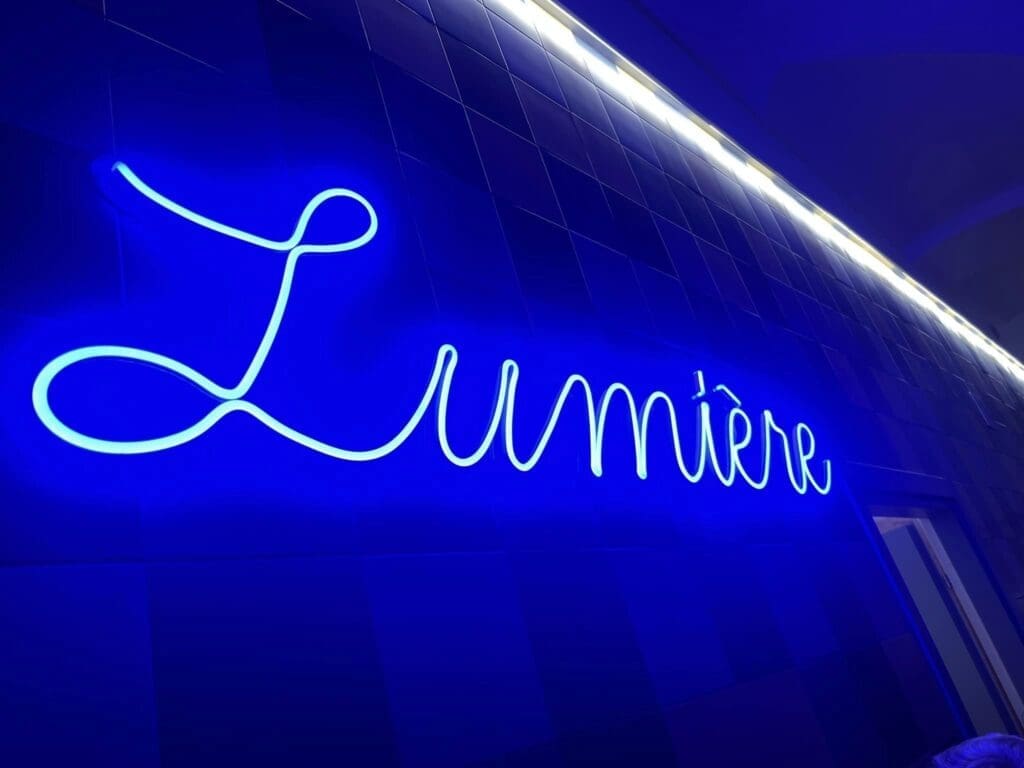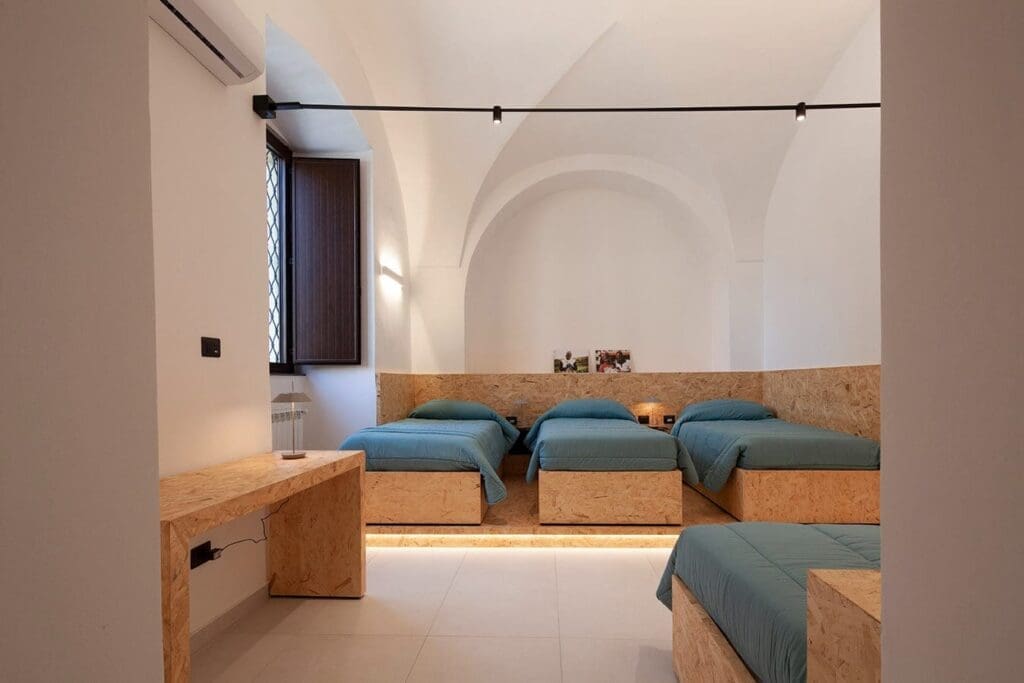Thanks to the efforts of the Vincentian Missionaries and the “Poverty Coordination,” Casa Lumière has become a beacon of hope, offering a welcoming environment and specialized resources to foster the recovery and independence of its guests.

Casa Femminile ‘Lumière’ has a history behind it, in fact before the renovation of the premises it was a low-threshold facility, i.e. a women’s dormitory, called ‘Rut’, where hospitality was only offered from 7:30 p.m. to 8:30 a.m. the next day, while still ensuring a hot meal at dinner, most often offered by local restaurants.
Inaugurated for the first time in 2004, the women’s dormitory was the work of the Vincentian Missionaries together with the ‘Coordination for Poverty’, the latter founded by them, individuals, religious and associations, with the aim of responding to the emergencies of the time. Soon after, the ‘Rut’ women’s dormitory was recognised by the Caritas Diocesan of Catania as a shelter for women in situations of great difficulty.
At the time, those who facilitated the running of the dormitory were the volunteers, who, motivated by a desire to help others, and perhaps also by a bit of recklessness, were not deterred by the precarious general conditions of the reception. In fact, it was precisely the ‘last ones’ of the Gospel who were welcomed: women without the culture of hygiene, often with psychiatric disorders such as anxiety, depression, etc.
Once a week, the volunteers organised meetings with the aim of talking to each other about the progress and conduct of the reception. Although the service lacked personal resources, it also lacked professional resources. Thus, from then on, a night worker took over the evening management of the dormitory, further guaranteeing the help provided so far to the women dormitory guests, but always with the valuable support of the volunteers.
With time, the presence of specialised workers in several fields increased and unfortunately so did the requests for help from women in poverty, vulnerable, victims of all kinds of violence. Through discussion during monthly supervision meetings between the team and this time with a Psychologist – Psychotherapist, it was realised that the service for women needed to be improved. In a context in which public policy action plans for women, at national and regional level, are difficult to implement, in which the gap between men and women on several fronts is so obvious, in which the difficulties of coping with external shocks, such as the one generated by the then pandemic, all this and much more, has a negative impact on women’s individual and collective well-being.
And since it was difficult to create a comfortable environment and an efficient service on our own, we turned to Fondazione Azimut (thanks to the support of Paola Riccioli, Managing Partner Fondazione Azimut Ente Filantropico ), which also made it possible to set up the ‘Pane Quotidiano’ Solidarity Cafeteria (October 2022) in Via Sant’Agostino 5/7, which houses the Listening Centre and Day Centre.
This is how Casa Femminile Residenziale ‘Lumière’ was born, located in Via Santa Maddalena no. 17 (CT), and recently inaugurated on 8 March 2024, the day on which International Women’s Rights Day is celebrated.
The new Women’s House now has 12 beds distributed in three rooms, each with an en-suite bathroom. Three modern rooms, furnished with salvaged material and with attention to detail by the architects of the Modus Lab studio: Claudio Torrisi, Erica Drago and Erika Zappalà and the visual Davide Sorge.
Each room is connected by a corridor enriched by coloured tiles in shades of blue, a soft and restful hue, while floors and walls are light coloured to brighten up the room, which is also enriched by a modern lighting system.
Being housed in a beautiful and welcoming environment is important because it promotes the recovery of the person in difficulty.
The name Lumière takes its inspiration from the experience of St. Louise of Marillac, co-founder of the Vincentian Sisters. In a dark moment of her existence, Luisa asked the Lord for a time of light, she asked to be free of anguish and doubt.
Casa ‘Lumière’ thus aims to be a place of light and rebirth for lonely and marginalised women, a space where they can find support for longer periods. The service offered is therefore now residential. The women beneficiaries are of different ages and backgrounds, with equally different experiences, demands and needs, but all are representations of the ‘web of suffering’.
Only active listening proved to be the main tool to support and bring out the real need of the person in the exploration of her own self. The listening relationship makes it possible to co-construct a new life project with the aim of making the person, the vulnerable woman, aware and independent.
The listening process can therefore be considered as the meeting of a common feeling in which in the helping relationship those processes are activated that allow one to walk side by side with the other through dialogue, which is also an essential tool to accompany the person and facilitate his or her fulfilment. Some feelings and emotions are often concealed in the person and therefore difficult to deduce, only listening fully to the other allows one to grasp those nuances that tell the personal experience.
Since the opening of Casa ‘Lumière’ to date, around 20 women in distress have been heard.

Anna 27 years old: grew up from an early age in a housing community. At the age of 18 she returned to her family but was unable to recover from the now conflictual relationship she has with her mother. The citizenship income for a first period allowed her to support herself but after it was revoked she was forced to leave the rented room
Florinda 40 years old: a woman who was adopted at the age of 11 by a family living in a Sicilian municipality. Her adoptive father proved to be violent over time, so much so that from the age of 14 to 18, Floriana was transferred to different communities for minors. First in Palermo, then Rome and later at the Sisters of Mother Teresa of Calcutta. She now works occasionally as a carer
Dora 25 years old: raised in a family home in Nicosia because her parents lost their parental authority. At the age of 18, she asked for an extension in the same family home until the age of 21 but was not granted it. He moves to Germany with his fiancé and there, thanks to his determination, manages to obtain a diploma. Despite an initial attempt at autonomy, he encountered difficulties and was unable to keep a job for more than a few months, so he decided to return to Catania.
Paola 58 years old: already a guest 8 years ago at the ‘Rut’ women’s dormitory. During that period of reception she had shown herself to be very aggressive and oppositional. Now she is reported by the social services because she has been evicted from the house she shared with her son and rented thanks to the citizenship income that has not been renewed.
Giada 61 years old: she returned from Marano, where she had joined her partner thinking she would start a cohabitation and instead found herself having to spend all her pension and savings to pay off the debts the latter had accumulated over the last few years
Chiara 33 years old: she leaves her home town because she has no ties to her family and because she is a victim of stalking. Thanks to her OSS diploma she manages to find a job for a while in northern Italy. After losing her job, she decides to return to her native Sicily. Unfortunately, the problems with the man who was threatening her persist. However, the young woman finds the strength to leave her home town and after a period in the car, she decides to ask for shelter at Casa Lumière.
Aurora 66 years old: in the past, after denouncing her husband, she was taken in at a shelter for women victims of violence. After the end of the sheltering period, she continues to be hosted at different shelters because she is not able to work due to her weight problems and her poor health. Because of her painful experience, she has shown difficulties in relations with the other users of the facilities where she has been received.
Farah 18 years old: Somali, asylum seeker waiting to enter a SAI structure (Sistema Accoglienza Integrazione). During the day, she attends Italian language classes at Civico Zero CT – (an organisation that provides support, reception and protection to foreign minors and new adults living alone in Italy). At the commission she reported a family member for perpetrating physical violence against her
Rachele 55 years old: she loses her rented home due to the non-renewal of her citizenship income. She has no family reference and to support herself she works two unstable jobs of a few hours for which she receives a derisory sum. She hopes to attend an OSA course in order to improve her work situation
Asha 18 years old, Tunisian: she was transferred from a CAS in Sicily where she was living with her uncle. During an interview with the interpreter she confides that her uncle sexually harassed her
Amina 18 years old: runs away from her family because her father uses drugs and has violent behaviour. For a long time she slept in the street
Hawa 24 years old, Senegalese: he lives in northern Italy with his family with whom he has a conflictual relationship, especially quarrels often with his father. She arrives in Sicily to start work but later discovers that it is a scam. After running out of money to pay for the B&B for her and her boyfriend, she asks for shelter because she is afraid of being on the street at night. She does not want to tell her father that she has been swindled because he is violent and would not let her leave for work.
Grazia 55 years old: she was a guest at a shelter but her young son almost forced her to leave the shelter and move in together. Unfortunately her son made her spend all her savings. Now she has no income and is looking for a job
These are just some of the stories of women who have turned to the Locanda del Samaritano O.D.V. to ask for a listening ear, understanding and sincere help, free of prejudice. Stories of women often subjugated by ‘a society’ that would have them without rights. Promoting and supporting the affirmation of women’s cultural and professional autonomy in order to increase women’s participation in public life and to get out of the tunnel of violence is the main purpose that drives the service c/o Casa Lumière.
Serena Sara Anastasi
communications operator and manager
Locanda del Samaritano O.D.V.

